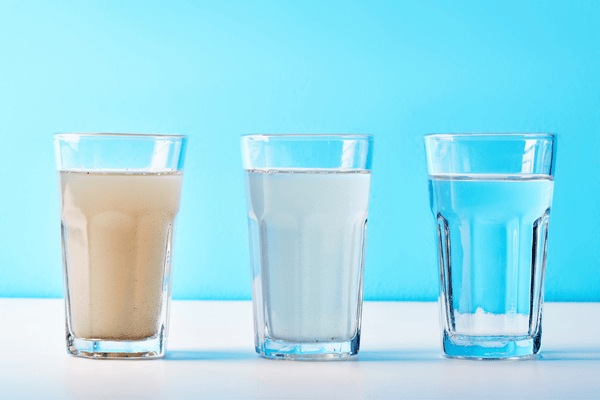Water is one of the most essential parts of daily life. Whether you’re drinking, cooking, bathing, or washing dishes, the quality of your water affects more than just hydration—it influences taste, cleanliness, and even the longevity of your plumbing and appliances.
Most households rely on municipal water systems, which are treated to meet safety standards. However, even treated water may contain minerals, chlorine, or other elements that affect its quality. By taking the time to test your water quality, you can better understand what’s in it and explore ways to make it even better- like a filtration system.
In this guide, we’ll walk through how to test your tap water quality, what to look for in your results, and how a filtration system can refine your home’s water for improved taste, clarity, and performance.
How Can You Tell If Your Water Could Be Improved?

Your water might be perfectly safe, but that doesn’t always mean it’s ideal. If you’ve ever noticed any of these signs, a filtration system could help enhance your water experience:
Taste & Odor Concerns
- Does your water have a strong chlorine taste? Municipal treatment facilities often use chlorine for disinfection, but some homeowners prefer a filter to refine the taste.
- A metallic taste could indicate trace minerals like iron or copper from pipes.
- If your water has a mild sulfur smell, it may contain harmless natural compounds that a filter can remove.
Cloudiness or Mineral Buildup
- Water should be clear and fresh-looking. If it appears cloudy or leaves behind white residue on faucets or dishes, it may have high mineral content (hard water).
- Blue or green stains on sinks and tubs can be a sign of copper in your pipes.
Skin or Hair Dryness After Showering
- Hard water can make soap and shampoo less effective, leaving hair feeling dull and skin feeling dry. A whole house water filter system or softener can help.
Buildup in Appliances or Plumbing
- Over time, hard water minerals can collect in dishwashers, water heaters, and coffee makers, reducing efficiency. Filtering out these minerals helps appliances last longer.
If any of these issues sound familiar, testing your water quality is the next step.
Easy Ways to Test Your Water at Home
You don’t need to be a scientist to check your water—there are simple and effective ways to learn more about what’s in it.
1. Use a Home Water Testing Kit
A water quality test kit is a convenient way to get quick insights into common water characteristics. These kits:
✔ Include test strips that react to specific minerals, chlorine, and contaminants.
✔ Are easy to use—just dip the strip in water and compare it to a color chart.
✔ Can help detect pH balance, hardness, chlorine levels, and bacteria presence.
While home kits are helpful for basic testing, they don’t always provide full details on trace metals, pesticides, or other contaminants.
2. Check Your Annual Water Quality Report
If you get water from a municipal source, your water quality report (Consumer Confidence Report) is available online or through your water provider. This report outlines:
✔ What’s in your local water supply
✔ Any treatment processes used.
✔ Whether your water meets or exceeds EPA safety standards.
Austin Water- Water Quality Reports
3. Try a Certified Lab Water Test for Deeper Analysis
For a comprehensive breakdown of your water, you can send a sample to a certified lab. Many labs offer mail-in kits that analyze your water for:
✔ Heavy metals like lead and copper.
✔ Bacteria, nitrates, and other potential concerns.
✔ Hardness levels and mineral content.
Testing with a lab gives you a detailed, science-backed report that can help you decide whether a water filter or treatment system would be beneficial.
Understanding Your Water Test Results
Once you’ve tested your water, here’s what to look for:
What’s Normal?
- pH levels between 6.5 and 8.5
- Minimal chlorine taste
- Clear, colorless water with no odor
What Might Need Attention?
- Hard water (high mineral content) – Causes buildup in pipes and appliances.
- Elevated chlorine levels – Can affect taste and dry out skin.
- Trace metals (iron, copper, lead) – May be from plumbing materials.
- Bacteria presence – Rare in municipal water but can happen in well systems.
If your results indicate high mineral content, excess chlorine, or unwanted trace elements, a filtration system can help optimize your water.
How a Filtration System Can Improve Your Water
Water filtration isn’t just about fixing problems—it’s about enhancing your water experience for better taste, gentler showers, and cleaner appliances. Here are some filtration options:
Carbon Filters
✔ Reduce chlorine taste and odor.
✔ Improve overall water clarity and freshness.
✔ Available for individual faucets or whole-home systems.
Reverse Osmosis Systems
✔ Remove trace metals, nitrates, and other contaminants.
✔ Provide bottled-water quality filtration at your sink.
✔ Ideal for improving drinking water taste and purity.
Whole House Water Filter Systems
✔ Filter all water entering your home for consistent quality.
✔ Help protect plumbing, appliances, and fixtures from mineral buildup.
✔ Improve the feel of showers, laundry, and dishwashing.
Choosing the right water filter depends on your specific water test results and what improvements matter most to you.
Keeping Your Water at Its Best
Once you’ve optimized your water quality, a little maintenance will keep it performing well:
✔ Test your tap water annually to monitor changes.
✔ Replace filters on schedule to maintain effectiveness.
✔ Flush your system occasionally to keep pipes and fixtures clear.
Final Thoughts: Elevate Your Water Quality with the Right Filtration System
While tap water is treated to meet safety standards, that doesn’t mean it’s perfect for your home’s unique needs. By taking the time to test your water quality, you can find ways to enhance taste, reduce buildup, and extend appliance life.
Whether it’s removing chlorine taste, reducing mineral content, or upgrading your entire home’s water system, there’s a filtration system that can help.
Want to Explore the Best Water Filtration Options for Your Home?
At AC Pros, we specialize in helping homeowners improve their water quality. Our team can test your water, recommend the right filtration solution, and install it with expert care.
Call us today at (737) 225-8428 or schedule a consultation online to start enjoying fresher, cleaner water in your home!
